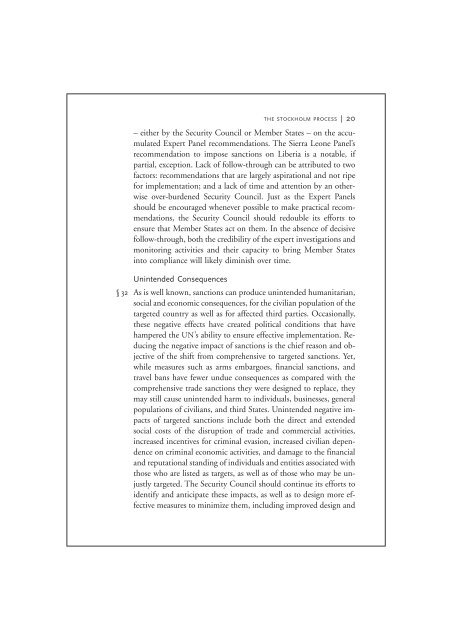Making Targeted Sanctions Effective - Small Arms Survey
Making Targeted Sanctions Effective - Small Arms Survey
Making Targeted Sanctions Effective - Small Arms Survey
Create successful ePaper yourself
Turn your PDF publications into a flip-book with our unique Google optimized e-Paper software.
THE STOCKHOLM PROCESS | 20<br />
– either by the Security Council or Member States – on the accumulated<br />
Expert Panel recommendations. The Sierra Leone Panel’s<br />
recommendation to impose sanctions on Liberia is a notable, if<br />
partial, exception. Lack of follow-through can be attributed to two<br />
factors: recommendations that are largely aspirational and not ripe<br />
for implementation; and a lack of time and attention by an otherwise<br />
over-burdened Security Council. Just as the Expert Panels<br />
should be encouraged whenever possible to make practical recommendations,<br />
the Security Council should redouble its efforts to<br />
ensure that Member States act on them. In the absence of decisive<br />
follow-through, both the credibility of the expert investigations and<br />
monitoring activities and their capacity to bring Member States<br />
into compliance will likely diminish over time.<br />
Unintended Consequences<br />
§ 32 As is well known, sanctions can produce unintended humanitarian,<br />
social and economic consequences, for the civilian population of the<br />
targeted country as well as for affected third parties. Occasionally,<br />
these negative effects have created political conditions that have<br />
hampered the UN’s ability to ensure effective implementation. Reducing<br />
the negative impact of sanctions is the chief reason and objective<br />
of the shift from comprehensive to targeted sanctions. Yet,<br />
while measures such as arms embargoes, financial sanctions, and<br />
travel bans have fewer undue consequences as compared with the<br />
comprehensive trade sanctions they were designed to replace, they<br />
may still cause unintended harm to individuals, businesses, general<br />
populations of civilians, and third States. Unintended negative impacts<br />
of targeted sanctions include both the direct and extended<br />
social costs of the disruption of trade and commercial activities,<br />
increased incentives for criminal evasion, increased civilian dependence<br />
on criminal economic activities, and damage to the financial<br />
and reputational standing of individuals and entities associated with<br />
those who are listed as targets, as well as of those who may be unjustly<br />
targeted. The Security Council should continue its efforts to<br />
identify and anticipate these impacts, as well as to design more effective<br />
measures to minimize them, including improved design and
















